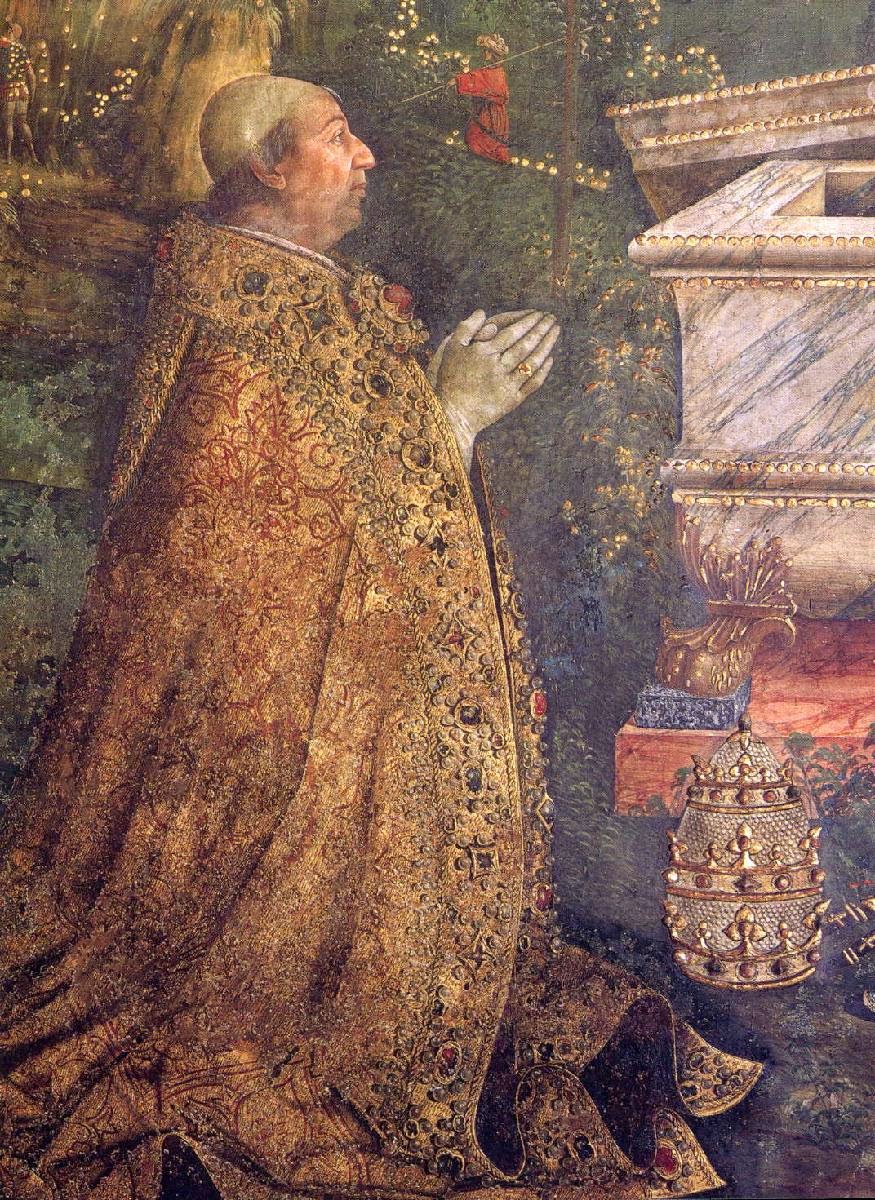I do not often speak to internal matters of church doctrine, but today someone requested that I write an article specifically for him, and so I will. He is a Catholic who does not understand how other Christians can reject the doctrines of papal supremacy and apostolic succession. The reasons are straightforward, and so I will lay them out here.
First, papal supremacy is not an ancient doctrine. It was established only in the 6th century. While there were some ancient ideas that the church at Rome might have a more prominent place than other churches, this was not doctrine until Gregory the Great (c. 540-604). The basis for the authority to declare papal supremacy comes from…the doctrine of papal authority–that is, because the pope has been entrusted as God’s viceroy on earth, he can declare that he is God’s viceroy on earth.
This is a circular argument, obviously, and to support it, you’d need evidence that the tradition of papal supremacy is actually ancient and also that it’s biblical. However, we know this is not the case.
The entire argument rests on the assertion of an unbroken succession from Peter, who is held by Catholics to have the ultimate authority among the apostles. However, Peter could not have been not the singular bishop of Rome in the first decades of the church, but was rather one bishop among several (and only associated with Rome for a part of his ministry!), so it’s simply impossible to say that he therefore has a singular successor. There was no early idea, either, that Peter, when he was martyred, then had a specific successor, either. Bishops were simply appointed in the number that was needed from among qualifying candidates. So Peter did not have a nominated successor. None of the apostles did.
When multiple bishops in each city was changed to a singular bishop in a more hierarchical organization, only then was there one bishop of Rome. But tying that bishop to Peter is a shaky argument, at best. He’s holding a new status, despite the same name, that Peter didn’t actually hold himself. Though a few bishops did see Rome as holding a special place as a primus inter pares (first among equals), that was by no means a consensus view in the early church.
Catholic doctrine points to the replacement of Judas Iscariot by Matthias (told in Acts 1:12-26) as evidence that succession did actually exist. But Judas Iscariot had a specific replacement because the apostles were restoring the symbolism of the twelve apostles as the founders of the new twelve tribes of Israel–tribes that would no longer be bound by blood but by faith. Matthias was not the successor of Judas but a replacement for him, needed only once because only one apostle betrayed Jesus. Other apostles had no replacements–there was no succession. The very idea of a specific succession from one apostle to their spiritual heirs dates from long after the apostles died.
In the narrow view, the one that is necessary for Peter to have a specific, personal spiritual heir, the idea is obviously specious. Who was Paul’s heir, then? John’s? James’? If Peter’s successor is important, then every apostle would need to have his own successor today. They don’t because the never did. Paul wasn’t even a bishop of any church at all. He didn’t stay in one place long enough to be rooted to a single church (because he had no wife and children, unlike Peter and most other apostles) but traveled constantly. Paul also did not meet the very criteria that he set out as being required for overseers/bishops. So why would a bishopric the a seat of succession when A) not all apostles were bishops, and B) those that were stood among other bishops in the same church?
The current organization of the Catholic church and the role of bishops is an innovation and a dramatic divergence from the early way of doing things. Catholics attempt to get around this by saying that Peter really was the only bishop who mattered, at least, and the later bishops who made such radical changes to the church really did have apostolic succession because it existed invisibly before anyone recognized it, so therefore these changes are themselves legitimate and can be used to then legitimate the Church’s way of doing things…but that’s not really a coherent argument at all. Again, it’s merely circular tail-chasing.
It is simply historically impossible that there was such a thing as apostolic succession that comes from Peter. The idea simply didn’t exist in the first century. Projecting a new doctrine into the past doesn’t make it retroactively exist in the past.
Without this form of specific apostolic succession, it doesn’t matter what kind of authority that Peter himself had. But the leg can be kicked out from under the argument of Peter’s authority, too.
The other necessary part of the argument is that the pope is the successor of Peter because Peter was the chief of the apostles, a role instituted by Jesus himself. There are two passages that are used as the proof-texts for this. The end of the Gospel of John is one of these, which the popes chose to interpret as Jesus giving Peter a special charge that he wasn’t giving to other apostles. However, there is nothing in this passage about Peter being the supreme apostle. Instead, Peter is being called to service and is being warned that he will be martyred. The three statements confirming Peter’s position as an apostle are much better understood in the light of Peter’s three rejections of Jesus after Jesus’ arrest. While people in the early church might have argued that Peter had invalidated himself because if his rejection of Christ, this passage shows the risen Christ affirming him as a true apostle. The other apostles didn’t need to be reinstated because they didn’t err the way the hotheaded Peter had. (I’m not sure whether I like the at-times crotchety Paul or the hotheaded Peter better, personally.) John is also using the passage to show that he was not specially positioned among the apostles because he was not martyred–the martyrdom of the other apostles is part of their ministry and testimony, not any sort of evidence of failure.
The other proof-text is Matthew 16:18-19, where Jesus says, “And I tell you that you are Peter, and on this rock I will build my church, and the gates of Hades will not overpower it. I will give you the keys of the kingdom of heaven. Whatever you bind on earth will have been bound in heaven, and whatever you release on earth will have been released in heaven.” Peter is Petros, the masculinized form of petra, or rock. Therefore, Catholics argue, Peter is the foundation of the church.
If this were the meaning of this passage, then we’d see in Acts all the other apostles acceding to Peter and treating him as their guide. But that is not what we see. The apostles make decisions through common agreement only, and Peter never has any sort of primacy whereby he’s commissioned to settle disputes through his special position. There is simply no evidence for a special position for Peter in the early church. The passage in Matthew also must be viewed not as a proof-text in isolation, as proof-texting is the source for all kinds of abominable distortions of scripture and is antithetical to the exegetical principle that scripture explains scripture. Instead, it should be viewed in its context. Here are the verses that come right before it, starting at v. 14:
When Jesus came to the area of Caesarea Philippi, he asked his disciples, “Who do people say that the Son of Man is?” They answered, “Some say John the Baptist, others Elijah, and others Jeremiah or one of the prophets.” He said to them, “But who do you say that I am?” Simon Peter answered, “You are the Christ, the Son of the living God.” And Jesus answered him, “You are blessed, Simon son of Jonah, because flesh and blood did not reveal this to you, but my Father in heaven! And I tell you that you are Peter, and on this rock I will build my church, and the gates of Hades will not overpower it. I will give you the keys of the kingdom of heaven. Whatever you bind on earth will have been bound in heaven, and whatever you release on earth will have been released in heaven.”
Peter’s confession is the rock upon which the church (or fellowship of people) is built, and Peter’s confession is what gives Peter the special name. The keys to the kingdom of heaven were given to Peter…and also later to Paul and other apostles who cast out demons and raised the dead in the name of Jesus. (The binding and loosing relates to power over supernatural beings.)
This authority came to Peter first, because he was the first to confess that Jesus was the Son of God, and then to the others. If this event had been understood as Peter receiving a place that no other apostle could rival, the Book of Acts would have had a very different shape.
Catholics also use a more general idea of apostolic succession to support the infallibility of the church and, indirectly, papal supremacy. It begins with the belief that the act of ordaining or commissioning someone into the priesthood, by laying on of hands and anointing with oil, must be ultimately traced back to the apostles, who were given that authority specifically by Jesus. The secondary belief is that as long as the priesthood carries this proper and unbroken chain of succession, it cannot be led into error, because the guidance of God is transferred along with the ordination.
However, all of the people of the early heresies were duly ordained through apostolic succession themselves. So then the argument becomes that while apostolic succession won’t keep individuals from straying from the truth, it will save the entire church, because there is the assurance that the church will be preserved.
This leads to the difficulty of the Schism, which would then demand that only the Catholic Church or the Eastern Orthodox Church is in error and has lost the apostolic succession. Since those with the legitimate guidance of God can’t be led astray, then only the right ones are those who retain actual apostolic succession, and everyone else isn’t even part of the church anymore!
But when we look more closely at the Scriptures, there is, in fact, no guarantee that entire church bodies bodies will not be lost, and there is absolutely no basis for the belief that apostolic succession (or ordination or commission) can prevent error. In fact, Paul goes so far as to flatly state that a church that tolerates sexual immorality will become entirely defiled in 1 Corinthians 5.
Despite this, we know that after the Catholic Church declared that its priests were to not married, the problem of priests keeping concubines was extremely well-known–specific priests living with specific concubines–for centuries. When that was suppressed, it was prostitutes, courtesans, and mistresses–and the higher the so-called men of God were within the church, the greater the depravity, especially in Italy and France. The level of debauchery was such that it would have embarrassed princes to behave as the prelates of the Catholic Church behaved on a routine basis. Paul gave endless warnings that unchecked sin is an error in itself and will lead to the straying of the entire church, but the Catholic Church uses the doctrine of apostolic succession to throw this out.
Now, the Eastern Orthodox and Catholic Churches came to this mistaken doctrine because of earlier errors that they had made. Over time, pagan belief systems influenced Christianity, and rituals took the place of belief as vehicles of salvation. Of course you were supposed to believe in the atonement of Jesus’ death and Jesus’ triumphant resurrection as the conquest of death and sin. But you also got little pieces of grace through the rituals of the church. The Lord’s Supper was recast mystically into an action that removes sin. Confession was needed for the remission of sin. Chrism (the anointing with holy oil) was needed for the remission of sin. Baptism established the salvation of infants (and those stillborn would go to hell as a necessary consequence–in later doctrine, this was revised to an eternity in purgatory). So what, then, would happen if the priest was defiled in some way and the parishioners did not know it? Would the various sacraments no longer work their salvific effect? The Church realized this would be a moral monstrosity and declared that apostolic succession assured the efficacy of the sacraments, not the particular moral state of the person administering it. Of course, if they had never distorted the doctrine of the sacraments into pagan ritualism, they never would have needed to invent this doctrine about apostolic succession, but this idea was then extended to the doctrine that the sins, excesses, and frank debauchery of the clergy had no effect whatsoever on the error or orthodoxy of the church.
If that is not enough, however, not only did the highest clergymen live in sexual depravity, but they also lived in indulgent luxury, living like the highest noblemen on money taken from their flock, while the poor around them suffered–something that rendered their faith dead according to James 2, and which flatly defied the command given by Jesus to Peter:
15When they had finished eating, Jesus said to Simon Peter, “Simon son of John, do you love me more than these?”
“Yes, Lord,” he said, “you know that I love you.”
Jesus said, “Feed my lambs.”
16Again Jesus said, “Simon son of John, do you love me?”
He answered, “Yes, Lord, you know that I love you.”
Jesus said, “Take care of my sheep.”
17The third time he said to him, “Simon son of John, do you love me?”
Peter was hurt because Jesus asked him the third time, “Do you love me?” He said, “Lord, you know all things; you know that I love you.”
Jesus said, “Feed my sheep. 18Very truly I tell you, when you were younger you dressed yourself and went where you wanted; but when you are old you will stretch out your hands, and someone else will dress you and lead you where you do not want to go.” 19Jesus said this to indicate the kind of death by which Peter would glorify God. Then he said to him, “Follow me!”
Yet we are supposed to believe that the very men who defied Jesus’ command to Peter were themselves the successors of a petrine supremacy!
Jesus himself demands that people judge others by their works:
15“Beware of false prophets, who come to you in sheep’s clothing but inwardly are ravenous wolves. 16You will recognize them by their fruits. Are grapes gathered from thornbushes, or figs from thistles? 17So, every healthy tree bears good fruit, but the diseased tree bears bad fruit. 18A healthy tree cannot bear bad fruit, nor can a diseased tree bear good fruit. 19Every tree that does not bear good fruit is cut down and thrown into the fire. 20Thus you will recognize them by their fruits.
Matthew 7:15-20, ESV
The qualifications for a bishop (or, in English, an overseer) are also explicitly laid out in 1 Timothy 3:1-7:
1The saying is trustworthy: If anyone aspires to the office of overseer, he desires a noble task. 2Therefore an overseer must be above reproach, the husband of one wife, sober-minded, self-controlled, respectable, hospitable, able to teach, 3not a drunkard, not violent but gentle, not quarrelsome, not a lover of money. 4He must manage his own household well, with all dignity keeping his children submissive, 5for if someone does not know how to manage his own household, how will he care for God’s church? 6He must not be a recent convert, or he may become puffed up with conceit and fall into the condemnation of the devil. 7Moreover, he must be well thought of by outsiders, so that he may not fall into disgrace, into a snare of the devil.
This qualifications are also mentioned briefly in Titus 1:5-9:
5This is why I left you in Crete, so that you might put what remained into order, and appoint elders in every town as I directed you— 6if anyone is above reproach, the husband of one wife, and his children are believers and not open to the charge of debauchery or insubordination. 7For an overseer, as God’s steward, must be above reproach. He must not be arrogant or quick-tempered or a drunkard or violent or greedy for gain, 8but hospitable, a lover of good, self-controlled, upright, holy, and disciplined. 9He must hold firm to the trustworthy word as taught, so that he may be able to give instruction in sound doctrine and also to rebuke those who contradict it.
These are the standards to which bishops were supposed to hold. Yet the Catholic Church banned married men from service (instead of only allowing married men with grown children to hold the office of bishop), and they did not remove men for any kind of disqualifying sin. There were bishops who led armies (carrying a truncheon instead of a sword so as not to “spill blood!”). All bishops lived in luxurious palaces by the Late Middle Ages, and as I mentioned before, rather than exhibiting self-control, the bishops and cardinals because famous for their debauchery. A Borgia, pictured above, even sat on the “throne of Peter”–a man with many bastards, who had open orgies in the Vatican, who set up his sons as Italian warlords, who murdered his political opponents, who broke marriage laws with impunity to marry off his bastards in the way he desired. There can not be any person in history who so clearly disqualifies the Catholic Church from the authority that it claims. No, a poisoned tree does not give good fruit–quite regardless of the bad doctrine of the salvific role of sacraments. There is no scriptural or even logical basis for this argument.
It is utterly absurd to hold the position that the prelates of the Catholic Church get to ignore scripture merely because they have “apostolic succession,” and this has resulted in 1400 years of practical indifference to fiscal, political, and sexual corruption. Catholic Church defends itself through the position that it, through the pope, is the only authority that may legitimately interpret and formulate doctrine, and on the basis of this, they can throw out the explicit standards set for bishops of the church, they can throw out the words of Jesus, and they can throw out Paul, who warned, “But even if we or an angel from heaven should preach to you a gospel contrary to the one we preached to you, let him be accursed. As we have said before, so now I say again: If anyone is preaching to you a gospel contrary to the one you received, let him be accursed.” The Church uses a very small part of the Bible to make the declaration that it has the authority to alter any doctrine in the Bible–and around and around we go, in an impossible circular argument that leads to nothing but error and corruption.
In the Middle Ages, the clergy kept concubines. In the Renaissance, the palaces of the bishops and cardinals echoed with the patter of the footsteps of their courtesans, prostitutes, and bastards. In the Reformation, the Council of Trent doubled down on the errors the Church had made before. And today, the cardinals are holding sex parties with male prostitutes in the very Vatican, using church money, while the Church ignored the plague of child sexual abuse that it had permitted to flourish within for decades. And yet we are supposed to throw out the passages of the Bible that very strictly says that no church that permits rot to spread is not itself spoiled by it and pretend that none of this can affect the grace and sovereignty that God is still giving to the church through the magical touching of apostolic succession.
There are many Catholics who are Christian. There are many very pious priests and nuns and laypeople who also do many great things. The Catholic Church still clings to many correct doctrines. Ironically, perhaps, it has even stood as a doctrinal bulwark against the flood of hedonistic degeneracy that has conflated physical pleasure with the positive virtue of love and has also resisted the cult of the orgasm to which millions of children are sacrificed every year.
However, the love of excessive and unqualified power has also caused the Catholic Church to stray into abuse and error, as it was warned in the Scripture that it must. The idea that apostolic succession, if it exists at all, prevents error and perversion from contaminating doctrine has no basis whatsoever except its own circular and utterly broken argument.
There was a time when the question, “Is the Pope Catholic?” was rhetorical. Even that is not true anymore, as the current Pope Francis seeks to undermine the most foundational doctrines of Christianity and Catholicism, while the Catholic theologians run interference to recast his statements into something other than frank heresies. The Catholic Church is teetering on the edge of a complete loss of coherence. When it’s over, all that’s left may be a bare communistic husk of the faith it once represented. I very much fear that the love of power that caused false doctrines to flourish in the first place are too seductive to allow the church leadership to repent and turn back to the right path.






